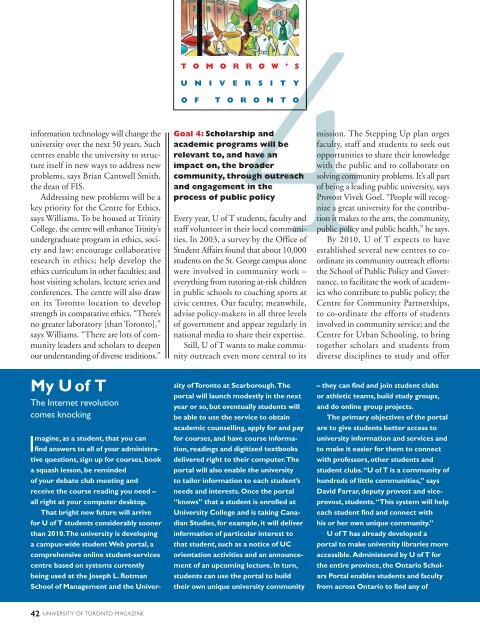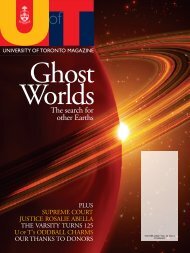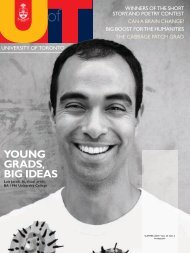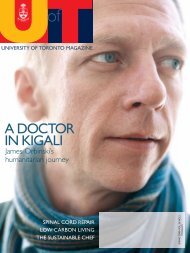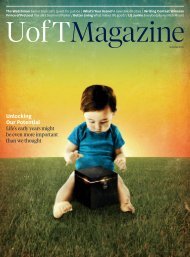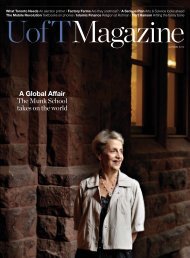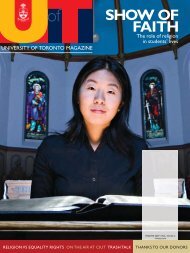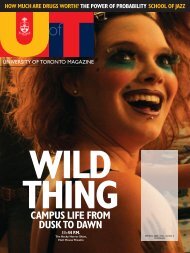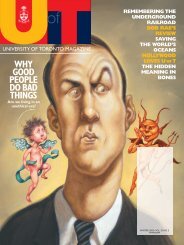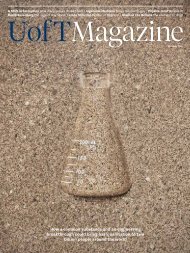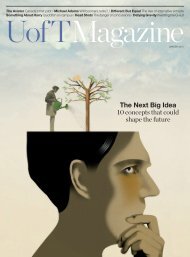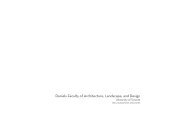Create successful ePaper yourself
Turn your PDF publications into a flip-book with our unique Google optimized e-Paper software.
34-38,40-44 3/2/05 5:40 AM Page 42information technology will change theuniversity over the next 50 years. Suchcentres enable the university to structureitself in new ways to address newproblems, says Brian Cantwell Smith,the dean <strong>of</strong> FIS.Addressing new problems will be akey priority for the Centre for Ethics,says Williams. To be housed at TrinityCollege, the centre will enhance Trinity’sundergraduate program in ethics, societyand law; encourage collaborativeresearch in ethics; help develop theethics curriculum in other faculties; andhost visiting scholars, lecture series andconferences. The centre will also drawon its <strong>Toronto</strong> location to developstrength in comparative ethics. “There’sno greater laboratory [than <strong>Toronto</strong>],”says Williams. “There are lots <strong>of</strong> communityleaders and scholars to deepenour understanding <strong>of</strong> diverse traditions.”4T O M O R R O W ’ SU N I V E R S I T YO F T O R O N T OGoal 4: Scholarship andacademic programs will berelevant to, and have animpact on, the broadercommunity, through outreachand engagement in theprocess <strong>of</strong> public policyEvery year, U <strong>of</strong> T students, faculty andstaff volunteer in their local communities.In 2003, a survey by the Office <strong>of</strong>Student Affairs found that about 10,000students on the St. George campus alonewere involved in community work –everything from tutoring at-risk childrenin public schools to coaching sports atcivic centres. Our faculty, meanwhile,advise policy-makers in all three levels<strong>of</strong> government and appear regularly innational media to share their expertise.Still, U <strong>of</strong> T wants to make communityoutreach even more central to itsmission. The Stepping Up plan urgesfaculty, staff and students to seek outopportunities to share their knowledgewith the public and to collaborate onsolving community problems. It’s all part<strong>of</strong> being a leading public university, saysProvost Vivek Goel. “People will recognizea great university for the contributionit makes to the arts, the community,public policy and public health,” he says.By 2010, U <strong>of</strong> T expects to haveestablished several new centres to coordinateits community outreach efforts:the School <strong>of</strong> Public Policy and Governance,to facilitate the work <strong>of</strong> academicswho contribute to public policy; theCentre for Community Partnerships,to co-ordinate the efforts <strong>of</strong> studentsinvolved in community service; and theCentre for Urban Schooling, to bringtogether scholars and students fromdiverse disciplines to study and <strong>of</strong>ferMy U <strong>of</strong> TThe Internet revolutioncomes knockingImagine, as a student, that you canfind answers to all <strong>of</strong> your administrativequestions, sign up for courses, booka squash lesson, be reminded<strong>of</strong> your debate club meeting andreceive the course reading you need –all right at your computer desktop.That bright new future will arrivefor U <strong>of</strong> T students considerably soonerthan 2010.The university is developinga campus-wide student Web portal, acomprehensive online student-servicescentre based on systems currentlybeing used at the Joseph L. RotmanSchool <strong>of</strong> Management and the <strong>University</strong><strong>of</strong> <strong>Toronto</strong> at Scarborough.Theportal will launch modestly in the nextyear or so, but eventually students willbe able to use the service to obtainacademic counselling, apply for and payfor courses, and have course information,readings and digitized textbooksdelivered right to their computer.Theportal will also enable the universityto tailor information to each student’sneeds and interests. Once the portal“knows” that a student is enrolled at<strong>University</strong> College and is taking CanadianStudies, for example, it will deliverinformation <strong>of</strong> particular interest tothat student, such as a notice <strong>of</strong> UCorientation activities and an announcement<strong>of</strong> an upcoming lecture. In turn,students can use the portal to buildtheir own unique university community– they can find and join student clubsor athletic teams, build study groups,and do online group projects.The primary objectives <strong>of</strong> the portalare to give students better access touniversity information and services andto make it easier for them to connectwith pr<strong>of</strong>essors, other students andstudent clubs.“U <strong>of</strong> T is a community <strong>of</strong>hundreds <strong>of</strong> little communities,” saysDavid Farrar, deputy provost and viceprovost,students.“This system will helpeach student find and connect withhis or her own unique community.”U <strong>of</strong> T has already developed aportal to make university libraries moreaccessible. Administered by U <strong>of</strong> T forthe entire province, the Ontario ScholarsPortal enables students and facultyfrom across Ontario to find any <strong>of</strong>42 UNIVERSITY OF TORONTO MAGAZINE


